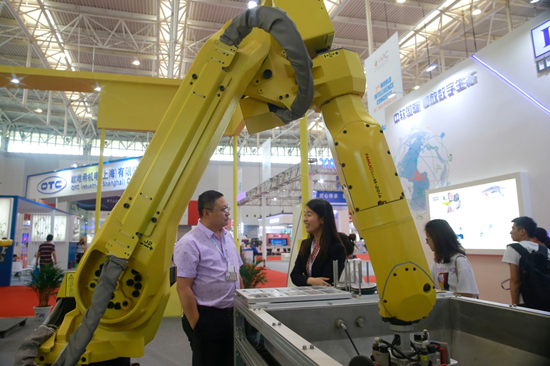
China banking on AI for innovation edge

A smart mechanical arm is on display at the second World Intelligence Congress in Tianjin on May 16, 2018. [Photo by Jia Chenglong/For China Daily]
China is stepping up the push to develop artificial intelligence in manufacturing to boost its productivity and inject new impetus into the country's economic growth, an official from the Ministry of Industry and Information Technology said on Thursday.
"We are experiencing a historical period of convergence of the new round of industrial reforms and the technological revolution. With the innovation of emerging technologies including AI, the manufacturing industry is evolving and innovating in a digital, networked and intelligent direction," Wang Ruihua, deputy director-general at the equipment industry department of the ministry, told a forum at the ongoing second World Intelligence Congress in Tianjin.
"We will take the opportunity to efficiently leverage information technology in industries and develop smart manufacturing to foster new drivers of growth."
With its booming big data and internet technologies, the nation has rapidly risen up the ranks of AI research globally. Now, China wants to further use AI to drive the upgrading of its manufacturing sector, which serves as the key driving force of the economy.
Seeing the new trend, Tianjin has been actively embracing smart manufacturing to gain core competence and boost local productivity, said Zhang Yuzhuo, a member of the Standing Committee of the CPC Tianjin Municipal Committee and the Party secretary of Tianjin Binhai New Area.
Tianjin, a major port city in North China, on Wednesday announced at the congress it is establishing a 100 billion yuan ($15.7 billion) fund to invest in artificial intelligence technologies. The new fund will focus on emerging fields including robots, smart software and hardware as well as intelligent vehicles.
The plan came as part of Tianjin government's larger efforts to accelerate the development of the local smart industry. Last year, Tianjin set up a 30 billion yuan smart manufacturing fund, aiming to help build the city into an advanced manufacturing research and development hub.
In 2017, more than 200 companies related to smart manufacturing have settled in Binhai New Area, reporting total annual revenues of more than 28 billion yuan, according to Zhang.
In July last year, China unveiled a national development plan to build a 1 trillion yuan AI core industry by 2030, which is supposed to stimulate as much as 10 trillion yuan of related businesses.

